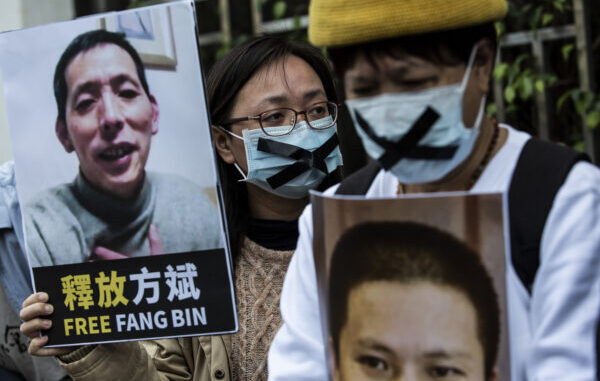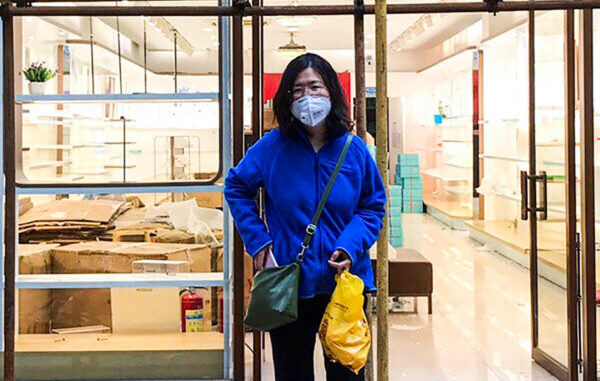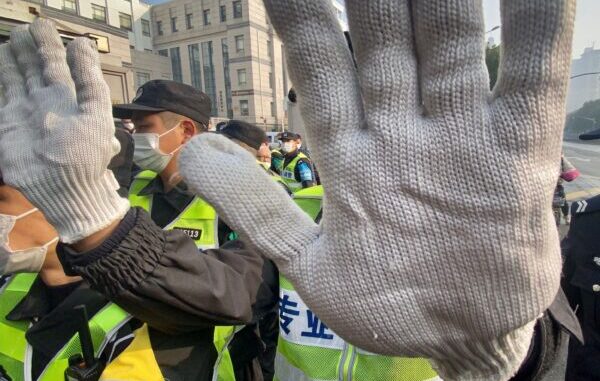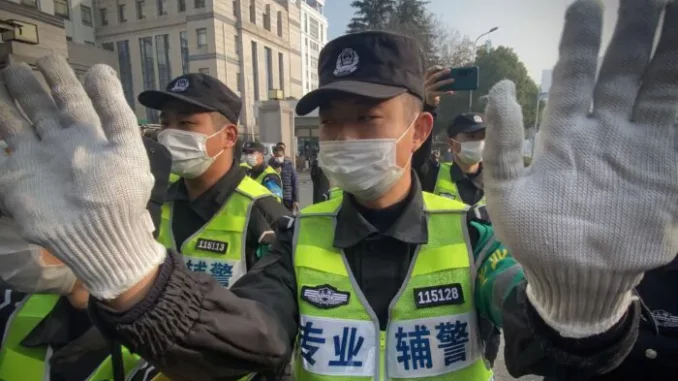T. Belman. Freedom of speech is indispensable to a democracy. Suppression of speech is indispensable to a totalitarian state. Of course it is ludicrous to compare them on the question of freedom. Democracies are more free. Perhaps they should be compared on how successful they are. Then the question is what constitutes success.
There is no pure democracy. Every country has a mixture of democracy and elitism, i.e., bottom up and top down. Or a mixture of socialism and capitalism. Every law that is passed curbs freedom.
By
Police attempt to stop journalists from recording footage outside the Shanghai Pudong New District People’s Court, where Chinese citizen journalist Zhang Zhan is set for trial in Shanghai on Dec. 28, 2020. (Leo Ramirez/AFP via Getty Images)
China joined other communist states—Vietnam and North Korea—at the very bottom of the latest Reporters Without Borders’ (RSF) World Press Freedom Index released on May 3, which was World Press Freedom Day.
China ranked in 179th place on this year’s index of 180 countries and regions, one spot above North Korea and one place lower than Vietnam. It fell four places from its ranking last year.
Communist China-controlled Hong Kong ranked 140th. The press freedom situation in the former British colony is classified as “difficult,” while in mainland China, it’s classified as “very serious.”
The annual World Press Freedom Index ranks nations and regions in five categories: the political context, the jurisdiction’s legal framework, the economic context, the sociocultural context, and safety.
RSF selects journalists, scholars, and human rights defenders to answer their press freedom questionnaire. It uses a quantitative tally of abuses against the media and journalists and a qualitative analysis of the observations from press freedom specialists to calculate a score for each country and region.
The report described the People’s Republic of China as “the world’s biggest jailer of journalists and press freedom advocates, and one of the biggest exporters of propaganda content.”
The RSF report pointed out that “Asia’s one-party regimes and dictatorships”—namely China and its regional neighbors North Korea, Vietnam, and Burma, which also is known as Myanmar, which came in at 173rd place—“are the ones that constrict journalism the most, with leaders tightening their totalitarian stranglehold on the public discourse.”
In these countries, similar to the former Soviet Union, “traditional media are closely controlled by the single party,” the Paris-based group stated.
“Independent journalists and bloggers who dare to report ‘sensitive’ information are often placed under surveillance, harassed, detained, and, in some cases, tortured,” the RSF stated.

In early 2020, The Epoch Times reported that Fang Bin, a citizen journalist in Wuhan, China, was jailed by the Chinese communist regime for reporting the truth about the COVID-19 pandemic in Wuhan. Three years later, on April 30, he was released but has been sent back and forth between Beijing and Wuhan by the police.
His family didn’t dare to allow him to return home because of threats they had received from authorities. As a result, Fang has been forced into homelessness and continues to be followed and monitored by plainclothes agents.
Another citizen journalist, Zhang Zhan, was also sentenced for reporting on the pandemic in Wuhan and is still behind bars.

“This once again shows that under the system of the Chinese Communist Party (CCP), it is impossible to bring about the freedom of speech and democratic thought by rapid economic development,” U.S.-based current affairs commentator Tang Jingyuan said about China’s rock-bottom ranking on NTD News’ Chinese-language “Panorama” program on May 5.
“This also illustrates that the red centralized system of the CCP has never loosened its grip on the minds of the people.”
China’s ally, Russia, also dropped in the press freedom ratings. It ranks 164th, nine places below its position last year.
Taiwan (Republic of China), described by RSF as one of the world’s “functional democracies,” was ranked 35.
No Freedom of Speech Under CCP
“The freedom of press in China continues to decline to the bottom,” Tang said. “It clearly shows that the CCP’s suppression of speech in recent years has reached a new height.”
Even Hu Xijin, the former editor-in-chief of the regime’s mouthpiece media “Global Times” and the CCP’s top propagandist, criticized the regime for its censorship and control over the news process in response to the RSF ranking.
“The media’s own news attributes must be protected and respected and cannot be made subordinate. [However], some regions and departments are now adopting a strong interventionist approach to news organizations, which is very debatable,” he posted on Chinese social media.

Tang said, “It is impossible to expect the CCP to change itself.”
“The CCP relies on guns and pens to steal power,” NTD’s Chen Weiyu said in her Chinese-language program “Wei Yu Sees the World.” “The so-called pen is to control news and propaganda. The reason why they value news and propaganda so much and must firmly control them in their hands is for disinformation.
“The CCP built the ‘Great Firewall’ for the same purpose, which is to prevent Chinese people from accessing real news and information.”
Tang said, “As long as the CCP system does not disintegrate, ordinary people or journalists will not have a day when they can truly speak freely.”




Great discussion Ted and Peloni. Ted, that stench you spoke of in USA can now be smelled all the way to Keyes from the W. D.C. area. A friend who spent 30 years in the capital moved to lower S. Carolina trying to escape the smell and he said it stinks down there also. 🙂
While in China one day I laid down on the street to check out the design of those 3 wheel wagons you see running around. small to pickup truck size. They run on belts. I thought, 1920-30 technology from down on the farm. easy to do, easy to fix and keep repaired. It also made me think…… who really invented gunpower and fireworks? The Chinese had to have stolen it from someone.
@Peloni
I am well aware of China’s theft of intellectual property and it’s reverse engineering. And of the West allowing them to. I am also aware how they lack the ability to be innovative and look to Israel for this. But they appear to be catching up.
https://www.weforum.org/agenda/2022/12/innovation-patent-filings-intellectual-property-ip-applications/#:~:text=Asia%2DPacific%20countries%20accounted%20for,China%20with%20almost%201.6%20million.
https://www.cecc.gov/freedom-of-expression-in-china-a-privilege-not-a-right
Does anyone think that the majority of Citizens in China care about freedom of speech, if they ever heard of it. I think not.
@Ted
One point of contention with your otherwise excellent observations is that China only progressed so rapidly as she has done over the past 30 years because the nations of the world were so enamored with the cheap Chinese labor and extensive Chinese markets that they turned a blind eye to the literal intellect, corporate and military espionage which China has conducted across the globe with an unabashed determination. Like an ever expanding cancer, China adopted policies to exploit the West for everything they could steal, and have even been so bold as to have created a competition, the Ten Thousand Talents contest, complete with a reward system for the co-opting of foreign secrets and shipping them home to China. Indeed, the lab leaks in Wuhan and elsewhere in China were the result of them using low level security labs while exploiting the knowledge expropriated from the West without the proper understanding or respect for what it was that they were dealing with, which required a higher degree of safety. As they stood on the shoulders of giants they towered above these giants without having earned the basis for standing so tall, as it were, and the result is a manufactured appearance of leaping forward beyond the abilities of any other society.
I should note that I find the Chinese to be a very motivated and capable people, but their motivations are focused upon mining secrets rather than pursuing discoveries of their own. Could they have developed for themselves the consequential achievements discovered over a century by the West in just a few decades? Well, perhaps they might have been able to do so, but instead they simply appropriated thru graft, corruption or outright theft what it was that looked most useful among the Western societies which let the do so.
As you note about the ingenuity of the individual providing an important expansion of Israel’s society, such a thing could be implemented in China, but instead they are ever looking to find something already deduced by others to bring home to China. Like some miners drawing minerals and metals from the Earth, their inventions are focused not upon new discoveries, but upon better exploiting the discoveries already made by someone else.
@Peloni
Some more thoughts.
In the case of war or emergency all states remove freedoms temporarily. This is commonly known as martial law.
WWI and the depression led to calls by the people in Germany and Italy for strong leadership rather than for democracy. e.g. Mussolini was supported because he made the trains run on time.
A corporation or army is managed by the elite and for good reason. Nevertheless, Israel strives to empower the individual soldier to take initiative and act on his own discretion. This suggests that the ingenuity of the individual should be enabled to contribute.
There are drawbacks to every system.
Look at how far China has progressed in the last 30 years. Could she have done this if she were a liberal democracy?
No country values freedom more than the US but look what has happened there. It has become a democracy in name only. Election fraud is routine. There is no way that Biden won the election yet the Courts were not up to the task of righting the ship. The country is ruled by a uniparty made up of Democrats and Rinos and supported by the MSM. Free speech is greatly restricted.
The country is ruled by oligarchs not the people.
Political dissenters are routinely persecuted and prosecuted.
@Ted
So when considering if a nation is more aligned with a totalitarianship or a democracy it would be instructive to determine if it is more overwhelming to list the restraints placed upon the citizens or the rights preserved for the citizens, respectively. Similarly, it would also be instructive to determine if it were more overwhelming to list the restrains placed upon the state or the powers restricted from the state, respectively.
Of course, the social contract between the state and the individual in any govt requires that the individual cede authority to the state such that the whole state can be maintained in a genuine harmony. If the emphasis is placed upon maximizing the harmony, it would lead toward a totalitarian state, whereas if the emphasis is placed upon minimizing the authority ceded by the individual, it would lead towards being a democracy.
Govt in any form, however, does require that the citizens acquiesce to some limit upon liberty, and the limit to which the public will forego the rights of free men will determine the true nature and context of the govt. The Chinese have a history replete with a great tolerance for governmental abuse, but only to a point, past which they are very reactive. To be distinguished with this example, Americans are very resistant to being abused by their govt. Indeed, their nation was founded upon the repudiation of a king which could not be judged to have been as onerous or as oppressive as the most mild of govts which were well tolerated by the Chinese.
The distinction lies, I would suggest, in the distinct natures of the people of the two nations, who, themselves, should be best left to judge their tolerance or repudiation of the injustices placed upon them by their respective govts before taking more reactive actions. It should be recalled that the consequence of any revolutionary movement, as seen in Iraq, will always be suffered by the native population, even when the spark igniting such revolutions comes from the wishes and interests of foreign lands imputing their values upon the domestic population.
Just some thoughts.
Looking more closely at the Reporters Without Borders’ World Press Freedom Index, it appears to have some heavy biases built in to its calculus. For instance, how is it that Ukraine stands at 79th while Russia is 164th, when Ukraine has published an execution wish list which includes journalists, many of whom have in fact been executed. Furthermore, Ukraine extends it support of the execution of journalists outside its borders and actively is holding a US/Brazil citizen journalist in its jails as we speak simply for discussing the war in Ukraine and offering his insights. Recall further that the Russian press in Ukraine has been all but dismantled due to their change in the language law. Is there any comparison to these assualts on reporters in Russia? And yet, it is Russia and not Ukraine which stands at the bottom of this list.
With regards to Israel, this list mislabels the state as ‘Palestine’ reinforcing the political bias even before recognizing that it is placed at 156th in the listing.
This Index is the height of fake news and any inflection taken from its scoring should be seriously qualified as being politically focused for Western conception. Like all western institutions, this list is well corrupted pass any meaningful use, which is regretful to report.
I just added a preface.